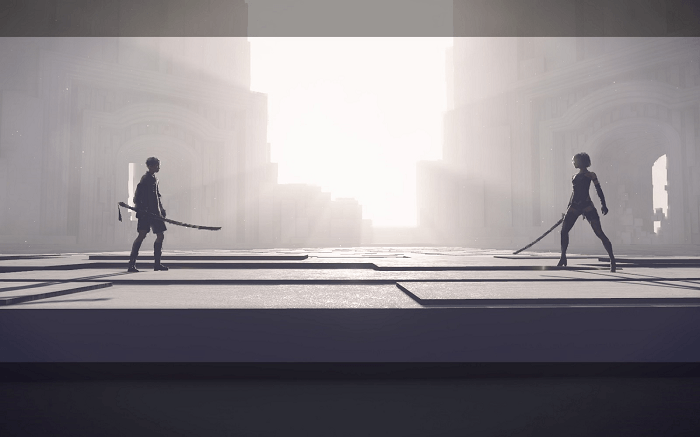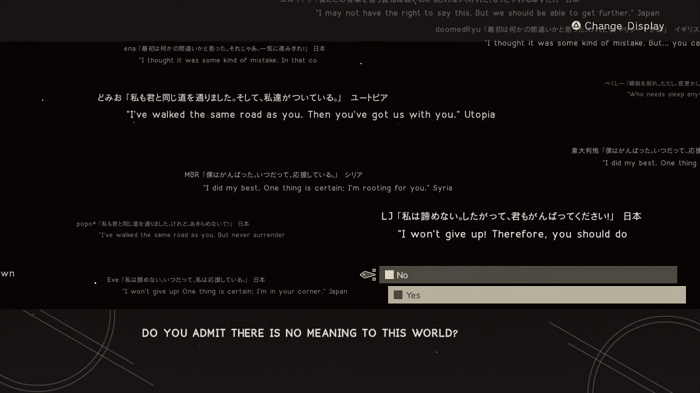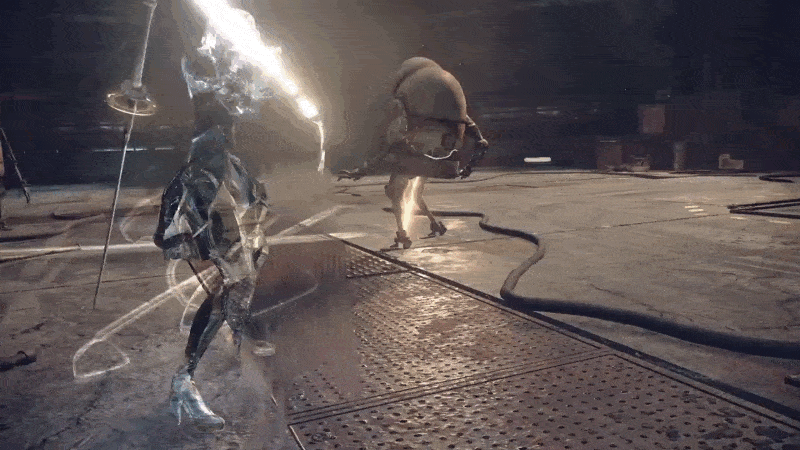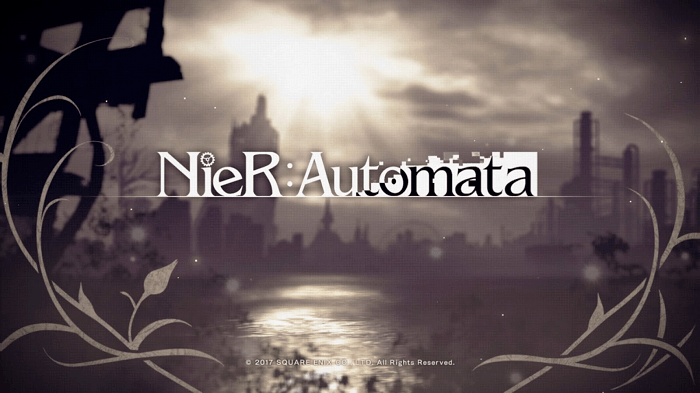***All The Spoilers for the story in Nier: Automata***
The message of Nier: Automata doesn’t become apparent until the fifth and final story ending of the game. In a game of bombast and spectacle, it’s a quiet moment that you might be forgiven for missing in the heat of the moment when the reveal comes.
Someday, human civilization will end. Either as a result of miscalculation on the part of our leaders, or the ultimate result of an indifferent universe, all of this will be gone someday. There will be no one to remember us, or how important it was that the Patriots win this year’s Super Bowl, or the horrors of the Transatlantic Slave Trade, or how proud you were of your child’s first word. In terms of time, the existence of humanity is less than the blink of an eye; it is the firing of a galactic synapse, a random, half-formed thought that flickered in deep space and then was snuffed out before anyone had a chance to even notice it.
What will happen to the things we value when we are gone? Not the material possessions or wealth, but the intangibles we say we truly value — love, kindness, hope, hatred, fear, sadness. Do these concepts exist independently of our ability to perceive and name them? Are our deeply held, core feelings just as fleeting as everything else about us?
That someday has already arrived in the world of Nier. Humans and the aliens who invaded our planet are extinct, leaving androids and machines stuck in a never-ending war. The gods are dead, and no one bothered to tell their worshippers. The androids and machines fight, die and resurrect in a near endless cycle of pain and grief to please deities who talk to them, but cannot listen to their prayers. When the eternal antagonists can no longer destroy each other, they turn on themselves. Over and over. We watch through Nier Automata’s multiple play throughs as we arrive at the same inevitable end: machines killing machines, androids killing androids.

Androids and machines assume the mantle of determining value on Earth, but in accordance with the will of their deceased gods. Androids, made in our image, replicate our behavior and follow our orders. Machines, designed to destroy us but fascinated by us all the same, absorb our ideas and recreate our social structures. Predictably, they meet the same fate as their creators.
Many writers have commented on the bleakness and sadness of Nier: Automata and the cycle of violence it accurately portrays is the closest it comes to embodying those descriptions. However, Nier: Automata is simply a distillation of the human experience of endless war and a search for meaning interspersed with moments of beauty and hope. If Nier is sad, it’s because life is sad. Many of Nier’s endings play on the randomness of death and the selfishness of people in avoiding it.
Except for Nier: Automata’s final story ending (there are actually 26 endings, but the majority of those are quick “joke” endings; only the first five have information relevant to the game’s story), after the protagonists are killed — the androids 2B, 9S, and A2 — the player continues the game as the Pods, helper robots assigned to each android. As the Pod, the player takes control of the hacking avatar, but instead of a normal hacking mission, the player is tasked with destroying the game’s lengthy credit sequence. As the credits progress, survival becomes more and more difficult until clearing the last mission is basically impossible. Each time you die, the game asks you if you want to continue:
GIVE UP HERE?
DO YOU THINK GAMES ARE SILLY LITTLE THINGS?
IS IT ALL POINTLESS?
DO YOU ACCEPT DEFEAT?
DO YOU ADMIT THERE IS NO MEANING IN THIS WORLD?
You say “No” to these questions, and you continue to endure against impossible odds to conquer this challenge. Each time you die, you are asked one of these questions. Yet something different is happening in the background. Messages of encouragement pour in from other players around the world.

Finally, after the frustration of being destroyed becomes too much, a new question appears:
RESCUE OFFER RECEIVED FROM MBR(MBR_KRS). ACCEPT OFFER?
When you say yes, a team of other players join you. They protect you from attack, giving their lives to save yours. They multiply your firepower, allowing you to tear through the credits with ease. The final challenge changes from impossible to a cakewalk.
All thanks to other people.
After defeating the end credits, the player is treated to one final cutscene, where the Pods of 2B and 9S are reassembling and reanimating their masters, as well as A2. The game ends before they are back online, and the player is left to imagine what comes next. Perhaps the androids live in peace on the remains of Earth; perhaps they renew the cycle of violence. Our cosmic fate may be sealed, but in the meantime, there is always a choice for people to make, and always a chance, however unlikely, that we will choose better.
Nier: Automata continually makes the point that war is pointless, but only as an end, not a means. The cruelty and anger we visit upon each other can become noble and good under the right circumstances, such as when the pacifist machine Pascal takes up arms to defend his village. It reminds us that death is inevitable, but not the end — literally, for the machines and androids who are downloaded back into new lives, but also figuratively, for humans who make their lives about more than themselves. When the team joins you in the final ending, some of them are destroyed. A simple message in the lower right-hand corner accompanies their explosion. “MBR’s data has been lost.” A life is gone, but the mission eventually succeeds. The player clears the challenge.

Finally, the player is given the opportunity to help other players in the future as they reach the last ending and the insurmountable challenge. The player can agree to help others as they were helped, but at a terrible price. They must agree to delete their save file. All their endings, levels, weapons, items, gone. That equaled fifty hours of my life, and in the context of a game, is the greatest sacrifice one can make. What is the player willing to give up for the benefit of another? What are any of us willing to lose? Nier: Automata asks you to answer that, and most damning of all, doesn’t judge you for your answer. No condemnation for selfishly choosing to preserve your save data. No celebration for acting selflessly for others. What motivates your choice then?
Only the realization that people matter. They’re the only thing that matters. Whether it’s the infinite life of an android, or the one solitary chance we get as humans, the only thing we know for certain is that there are other people here, right now. Is there a God? An afterlife? Some grand lesson to learn before we ascend? Maybe, maybe not. But there is Me. There is You. There is We. As long as we have that, who needs eternity?
Are you following Black Nerd Problems on Twitter, Facebook,Instagram, Tumblr, YouTube and Google+?



Show Comments